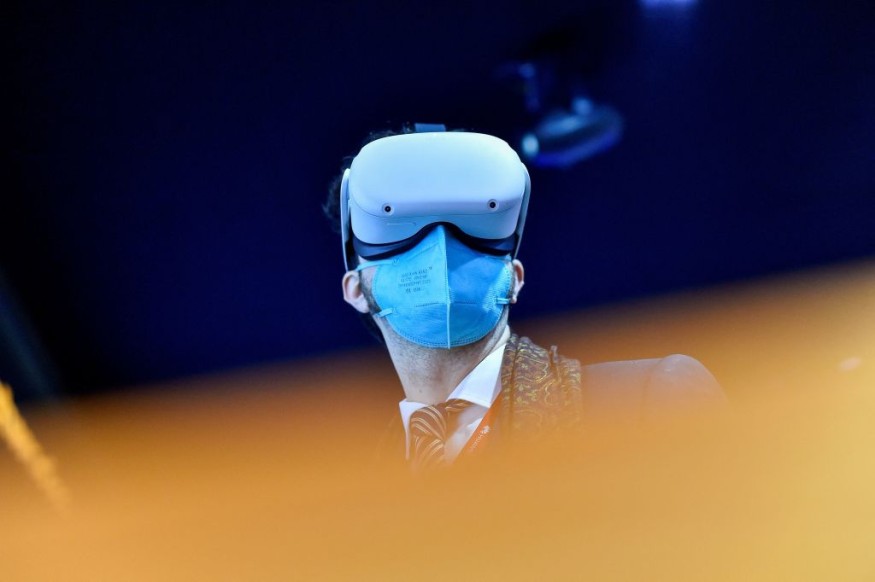Researchers said virtual reality might be a great approach to assist patients with psychosis to cope with their symptoms.
Indy100 said the fear of going outdoors (or agoraphobia) is a prevalent symptom of psychosis, and the new strategy is intended to treat it.
Mayo Clinic further explained that agoraphobia is a form of anxiety disorder when one fears and avoids locations or circumstances that make them feel imprisoned, powerless, or ashamed.
Patients can now utilize the VR experience to virtually leave the house and do things such as going to the store and communicating with others.

A visitor wears a virtual reality (VR) headset on the opening day of the MWC (Mobile World Congress) in Barcelona on February 28, 2022. - The world's biggest mobile fair is held from February 28 to March 3, 2022.
Virtual Reality Therapy Treats Agoraphobia Patients Suffering From Psychosis, Schizophrenia
According to a new report published in the journal The Lancet Psychiatry on Tuesday, researchers performed the largest clinical trial using virtual reality treatment to treat patients with psychosis and schizophrenia.
The study was part of gameChange, a program designed by the University of Oxford and Oxford Health NHS Foundation Trust to treat agoraphobia, a severe dread of being outside that is also a common symptom of psychosis, with virtual reality.
Patients wore VR headgear for six weeks. They participated in six 30-minute therapy sessions in addition to usual treatment (taking prescribed antipsychotic medication, receiving regular visits from a mental health worker, and visiting with a psychiatrist).
ALSO READ : Are Police Needed in Virtual Reality? Crime, Sexual Exploitation Still a Concern in Metaverse
They started each session in a virtual therapist's office before moving on to simulated outside events like waiting at a bus stop, visiting a café, or going to the doctor to help patients acclimatize to and gain confidence in unfamiliar situations in real life.
How Virtual Reality Helped Patients Go Outside
The simulations are pretty realistic and according to the researchers, virtual reality made the patients feel more comfortable and willing to take chances with specific interactions.
Daniel Freeman, the lead author of the study and professor of clinical psychology at the University of Oxford, told The Guardian: "There's a little bit of the conscious bit [of the brain] going: 'OK, it's OK, I know it's not real, and therefore I can persist, try something new and do something differently."
Compared to a parallel group of patients who just got typical usual care therapy after six weeks, Freeman and his colleagues discovered that the trial was an overall success for the program, leading to a considerable drop in patients avoiding day-to-day outside circumstances. They also observed that the individuals with the most severe agoraphobia improved the most following the therapy.
"Individuals who were largely housebound have got back outside," Freeman said, referring to the program's excellent results in helping those with mental health problems.
"I've been able to make eye contact with people more, without feeling really anxious, I've been able to walk down a street without worrying about anyone walking towards me. I'm now able to go into a café. I feel much more confident about going on a bus. I just feel so much more confident than I was," one patient said in a statement.
Another patient told the Guardian that he had trouble getting on the bus to visit his father's cemetery before receiving the VR therapy. The gameChange simulations, on the other hand, helped him develop the confidence he needed to undertake the journey.
The authors of the study believe that virtual reality headsets might be disseminated and provided to patients in the future to assist them in acquiring confidence before going outdoors anytime they wish. They also anticipate that other scenarios may be created to assist patients with even more sophisticated social interactions in the future.
Overall, the new findings provide the most comprehensive examination of how virtual reality may be utilized to treat mental illness to date. If these findings are any indication, the therapy might be a game-changer for people suffering from chronic mental illnesses.
RELATED ARTICLE : Metaverse Dating: Why Romantic Experience in Virtual Reality is More 'Immersive' Than Online Courtship?
Check out more news and information on Technology in Science Times.










